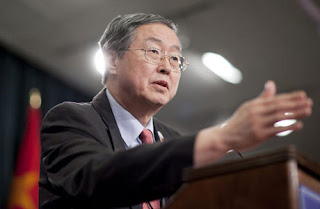China capital account opening
 |
| Zhou Xiaochuan- August 19, 2013 |
China is at a crossroads. The new leadership has so far shown determination to reform and to find solutions to excessive savings. Here are some key facts for 2013.
March 2013 : Zhou Xiaochuan reappointed as the Governernor of the People’s Bank of China (PBoC)
March 2013 : Zhou Xiaochuan reappointed as the Governernor of the People’s Bank of China (PBoC)
China will promote the convertibility of Renminbi
under capital accounts step by step, although the yuan's increasing
cross-border use will accelerate the process, People's Bank of China (PBOC)
governor Zhou Xiaochuan said Wednesday, March 13, 2013.
May 2013 : Reshaping the growth model
Officials at an executive meeting of the State Council
led by Premier Li Keqiang said on Monday May 6, 2013 that China would propose
an operational program within the year to make the yuan more convertible in the
capital account.
The move comes after Li promised in March to open the
economy further to market forces and take
away some power from government departments as part an effort to reshape the
growth model.
Ding Zhijie, head of the School of Banking and Finance
at the University of International Business and Economics, said the full
capital-account convertibility would be a systemic foundation for China to be
more involved in the global economy.
Officials also called for a mechanism to let
individuals invest overseas, which echoed an announcement in January by the
central bank, saying it would proactively prepare for a trial of its qualified
domestic individual investor program, known as QDII2.
The program, which was started
by the government in 2006, allows Chinese individuals to buy securities in
overseas markets through asset managers and funds.
Next step: third
plenary meeting of the Communist Party's 18th National Congress slated for this
autumn
Huang Yiping, managing director
and chief economist for the emerging Asia department at Barclays Capital, said
that fiscal reform and loosening of the hukou system would likely to be
implemented soon, followed by measures on interest rate and exchange rate
liberalization and opening up the
capital account.
Potential consequences on real asset prices
This could release a wave of
Chinese savings abroad, radically shifting real asset prices up and government
bonds down, especially in America.


Comments